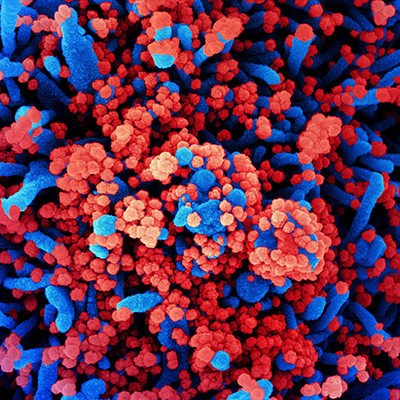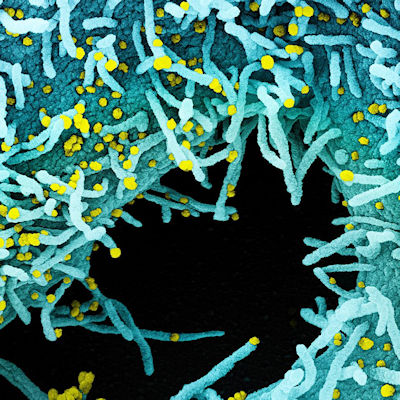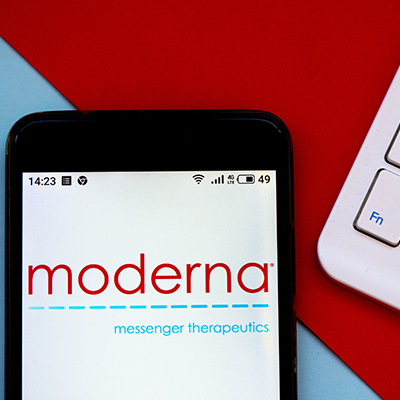August 5, 2020 -- Could vaccine platforms developed for previous coronaviruses be converted to address the current COVID-19 pandemic? An August 5 report in Nature described how researchers leveraged previous vaccine research to develop messenger RNA (mRNA)-1273, a new SARS-CoV-2 vaccine candidate.
Academic and government infectious diseases researchers from the U.S. have been working with emerging viruses to develop innovative and effective solutions to combat SARS-CoV-2 infection. They have previously demonstrated that prefusion-stabilized protein immunogens preserve neutralization-sensitive epitopes and are a viable vaccine strategy for enveloped viruses.
The researchers had previously identified 2 proline substitutions (2P) at the apex of the central helix and heptad repeat 1 that stabilize MERS-CoV, SARS-CoV, and CoV-HKU1 spike (S) proteins in the prefusion conformation. Furthermore, they had found that the MERS-CoV S-2P protein they identified was more immunogenic than wild-type S proteins.
The 2P has been widely transferrable to other Betacoronavirus S proteins, suggesting that it may make a successful approach for designing stabilized prefusion Betacoronavirus spike vaccine antigens. In the Nature paper, the researchers described how they used MERS-CoV as a prototype pathogen for betacoronaviruses to optimize vaccine design.
They evaluated mRNA formulated in lipid nanoparticles (mRNA/LNP) as a delivery vehicle for MERS-CoV S-2P. Immunization with MERS-CoV S-2P protein elicited potent pseudovirus-neutralizing activity in a dose-dependent manner, demonstrating that mRNA expressing the S-2P protect is protective against MERS-CoV.
Timeline of converting vaccine from MERS-CoV to SARS-CoV-2
Within 24 hours of the release of SARS-CoV-2 isolate sequences, the 2P mutations were substituted into the spike positions 986 and 987 to produce prefusion-stabilized SARS-CoV-2 S-2P protein for structural analysis and serological assay development.
Within five days, current good manufacturing practice production of mRNA/LNP expressing SARS-CoV-2 S-2P as a transmembrane-anchored protein within the native furin cleavage site (mRNA-1273) was initiated in parallel to preclinical evaluation.
The first-in-human phase I clinical trial was initiated on March 16, only 66 days after the first viral sequence was released. Phase II testing began 74 days later on May 29.
Validating the newly converted vaccine
Concurrently, the expression and antigenicity of the S-2P antigen delivered by mRNA was being confirmed in vitro and the immunogenicity of the mRNA-1273 candidate was documented in several mouse strains.
Initially, mice were immunized intramuscularly twice at 0.01, 0.1, or 1 µg of mRNA-1273 at a three-week interval. The researchers found that the vaccine induced dose-dependent spike-specific binding antibodies after prime and boost in all strains. Potent pseudovirus-neutralizing activity was elicited at the 1 µg level.
The researchers also evaluated mice that received a single dose of mRNA-1273 to determine if a one-dose vaccine regimen was effective. The vaccine induces spike-binding antibodies in immunized mice with a dose of 1 or 10 µg, and the higher dose produced an increasing neutralizing antibody effect over time. These results suggest that mRNA-1273 could be effective with a single dose.
Seven weeks post-boost, cytokine patterns in vaccine-induced memory T cells were determined by intraceullular cytokine staining. The researchers found that mRNA-1273 elicited CD4+ T cells with a primarily Th1-dominant response, indicating a balanced Th1/Th2 response. By contrast, SARS-CoV-2 S-2P protein produced a Th2-biased response, which can cause vaccine-associated enhanced respiratory disease.
Protective immunity was assessed in mice with substitutions that effectively allowed binding of SARS-CoV-2 to the mouse angiotensin-converting enzyme 2 (ACE2) receptor and infection and replication in the upper and lower respiratory tract. Mice that received two 1 µg doses of mRNA-1273 were completely protected from viral replication in the lungs after a challenge at five- or 13-week intervals following boost.
The vaccine candidate reduced viral replication to near-undetectable ranges in the nasal passages of mice in a dose-dependent manner. A single dose of the vaccine also completely protected against lung viral replication after a seven-week challenge.
The researchers noted that the levels of pseudovirus-neutralizing activity induced by 1 µg of mRNA-1273 in mice is similar to that induced in humans by 100 µg, which is the dose level at which the vaccine is being evaluated in phase III clinical trials.
The data ascertained from immunogenicity mouse models and nonhuman primate studies were used to help inform the dose and regimen of mRNA-1273 in late-stage clinical trials.
The mRNA/LNP vaccine platform developed originally for the MERS-CoV S protein was easily adapted to address the COVID-19 outbreak. The resulting vaccine candidate has been proven as a safe and scalable solution that can be translated into a commercial mRNA vaccine delivery platform.
This approach also provides proof of concept for a prototype pathogen approach for pandemic preparedness and responses.
Do you have a unique perspective on your research related to vaccine development or virology? Contact the editor today to learn more.
Copyright © 2020 scienceboard.net










